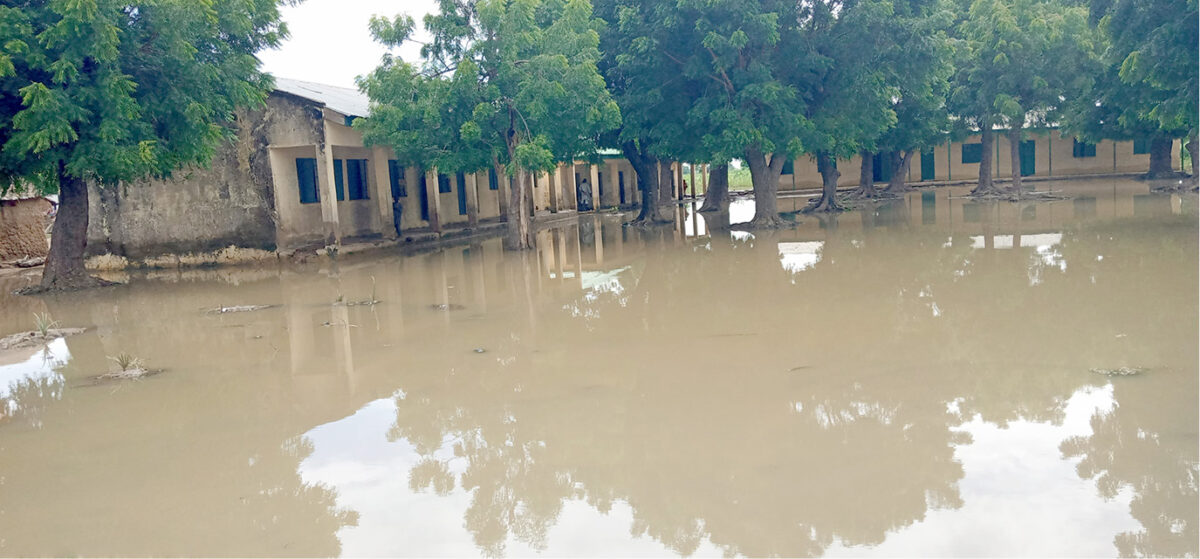One of Nigeria’s most predominant natural disasters is recurrent flooding, making some states to increasingly experience flooding during the rainy season. One of the main causes of recurring floods around the world is climate change. However, in addition to climate change, Nigeria’s flooding can also be attributed to improper planning and provision of essential infrastructure. Nigeria’s worst flooding in history was experienced in 2012, with losses amounting to about $16.9 billion.
Among the 17 sustainable development goals for attaining human development by 2030 as outlined by the United Nations, more than half of those goals could be threatened directly by flooding. For example, flooding can affect the provision of clean water and sanitation, as well as eradication of poverty and hunger. Accordingly, flooding portends a threat to sustainability given that it could affect health, social life, environment and the economy negatively.
- NITEL/Mtel pensioners laud finance minister, PTAD on arrears payment
- Lalong tipped as Tinubu’s campaign DG
The causes of flooding in Nigeria are mostly anthropogenic and they are generally worsened by improper interactions between human systems and the natural environment. Sometimes many residential areas have poor drainage conduits, depending on natural drainage channels to pass off the surface runoff. As urbanisation increases, it also means that the natural environmental setting is altered to a large degree such that the built environment cannot absorb water, leading to increased runoff.
Another cause of flooding in Nigeria is related to the poor handling and management of waste, especially solid waste. The general attitude of people toward waste disposal and the lack of proper waste disposal services, especially in semi urban and rural areas is a major contributor to flooding. These solid wastes have often blocked major drainage systems even in the most urban centres of the country. In addition, the unregulated municipal expansion due to increased population and migration from rural and semi urban areas leads to incommensurate urban infrastructure and amenities. The agrarian areas are also increasingly transformed to residential areas to address growing housing deficits, without appropriate planning.
Dishonesty in the way and manner some town planning officials conduct their duties also leads to inappropriate and unauthorised use of land and modification of approved masterplans. These practices embolden some persons to ride on the backs of ineffective control by outspreading their structures over unapproved places, such as erecting buildings over drainage.
Recently, Professor Mansur Matazu, the Director-General of the Nigerian Meteorological Agency (NiMet), advised Nigerians, especially the inhabitants of Taraba and some parts of the southwest to prepare for flooding due to expected rainfall. According to Professor Matazu, NiMet had recorded 95 per cent precision in their predictions over the last 15 years. He further expressed concerns that some states and local governments were not adhering to early warnings issued by the government by aligning to activities at the national level that are aimed at mitigating the effects of floods. He also highlighted the need for Ministries, Departments and Agencies (MDAs) to consider all warnings from NiMet to mitigate the impact of flooding.
In addition to the measures currently in place as regards warning and mitigation systems, there are still challenges that need to be overcome. For example, a flood management policy is missing in Nigeria. This means that there are gaps in terms of appropriate legal and policy frameworks for the control and management of flooding in Nigeria. Another example of what could be done is to always integrate flood risk management as a key component of our urban and regional planning activities. Research has shown that historically, Nigeria has been more fixated on post-flooding response than control. Thus, the government can prioritise the exposure to flood risk as part of the country’s disaster risk management agenda. To achieve this, the government can draw lessons from the 2012 post-disaster risk assessment report conducted in Nigeria with the aid of internal collaborators.
All the required skillset necessary to achieve these can be sourced from within Nigeria. Furthermore, the National Emergency Management Agency (NEMA) could utilise the Geographic Information System (GIS) to produce credible flood data around the country. It is also important to have effective national early warning systems in place to alert Nigerians on any impending floods at local, state and federal levels. As much as the MDAs provide seasonal rainfall predictions, it is equally pertinent to improve their communication internally between the MDAs, and externally between the MDAs and Nigerians. To improve on sustainable practices, climate resilient infrastructure should be encouraged across the country. Building climate resilient infrastructure could involve a series of management measures such as changing maintenance schedules and the inclusion of adaptive management to consider uncertainties that could occur in the future. This also should include structural measures such as raising the elevations of buildings to account for water level rise or using natural infrastructure such as protecting or enhancing natural drainage systems. We at Daily Trust believe that if these steps are taken, anthropogenic causes of flooding would be addressed effectively as a means for Nigeria to achieve the sustainable development goals.

 Join Daily Trust WhatsApp Community For Quick Access To News and Happenings Around You.
Join Daily Trust WhatsApp Community For Quick Access To News and Happenings Around You.


